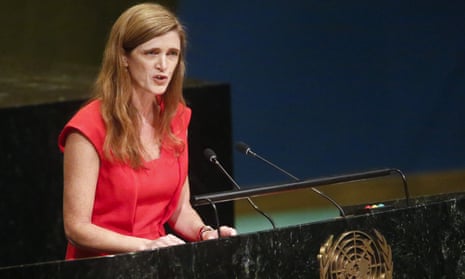The US abstained for the first time on Wednesday in a UN vote denouncing the continuing congressional embargo on Cuba.
The Obama administration has relaxed some of the half-century-old sanctions on Cuba over the last two years, a process that culminated in a presidential visit to the Caribbean island state in March and the resumption of commercial flights to Havana. But the Republican-dominated Congress has refused to lift the bulk of the trade restrictions, saying the communist government has not done enough to improve human rights.
At a session of the UN general assembly to debate an annual resolution calling for the lifting of the embargo, the US ambassador, Samantha Power, took to the lectern to make the same argument the administration has been making in Congress – that the embargo has been backfiring for years.
“For more than 50 years, the United States had a policy aimed at isolating the government of Cuba. For roughly half of those years, UN member states have voted overwhelmingly for a general assembly resolution that condemns the US embargo and calls for it to be ended,” Power said.
“The United States has always voted against this resolution. Today the United States will abstain,” the ambassador said, to loud applause in the chamber.
The resolution was passed by 191 votes, with no votes against and only the US and Israel abstaining, emphasizing congressional isolation on the issue. However, the vote is not legally binding on member states.
Explaining the abstention, Power said the administration had called on Congress to lift the embargo but not for the reasons laid out in the UN resolution, which suggests they are in violation of international law. Power said the embargo was legal, but ineffective.
“[T]he resolution voted on today is a perfect example of why the US policy of isolation toward Cuba was not working – or worse, how it was actually undermining the very goals it set out to achieve,” Power said. “Instead of isolating Cuba, as President Obama has repeatedly said, our policy isolated the United States, including right here at the United Nations.”
Power stressed that the abstention did not mean that the US “agrees with all of the policies and practices of the Cuban government”.
“We are profoundly concerned by the serious human rights violations that the Cuban government continues to commit with impunity against its own people,” she said.
Cuba’s foreign minister, Bruno Rodríguez, described the abstention as a “positive step for the future of improving relations between the United States and Cuba”, but noted that most of the sanctions “are still in force and are fully implemented today by US government agencies”.
Cuba claims that the embargo has caused nearly $5bn in damages to the island over the past year and nearly $126bn since it was first imposed after the 1959 Cuban revolution in what Rodríguez called “a flagrant violation of international law”.

Comments (…)
Sign in or create your Guardian account to join the discussion